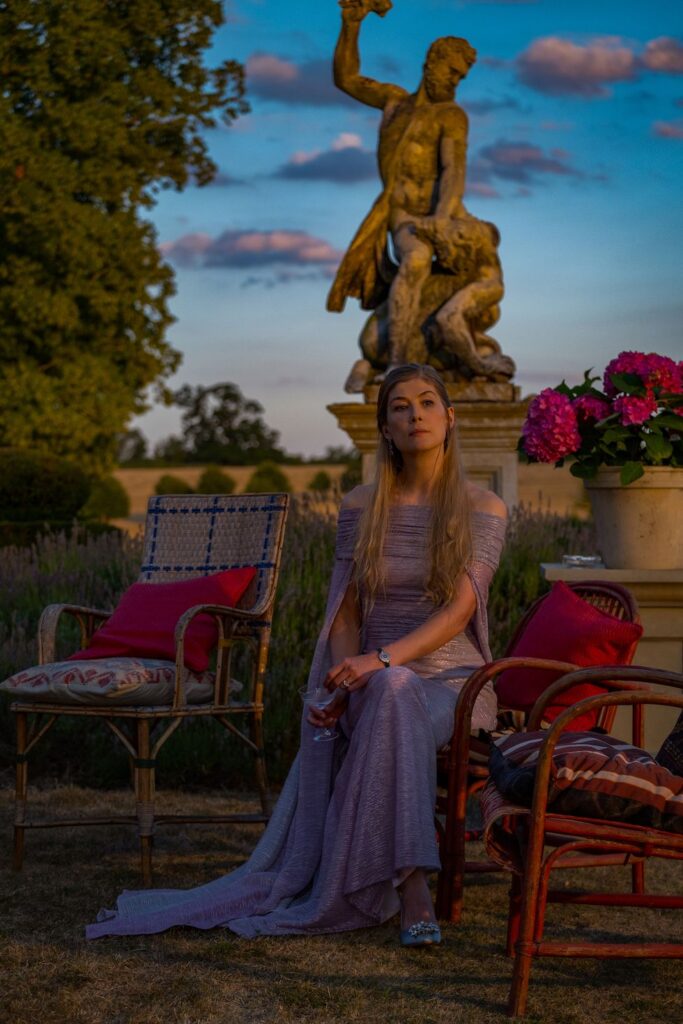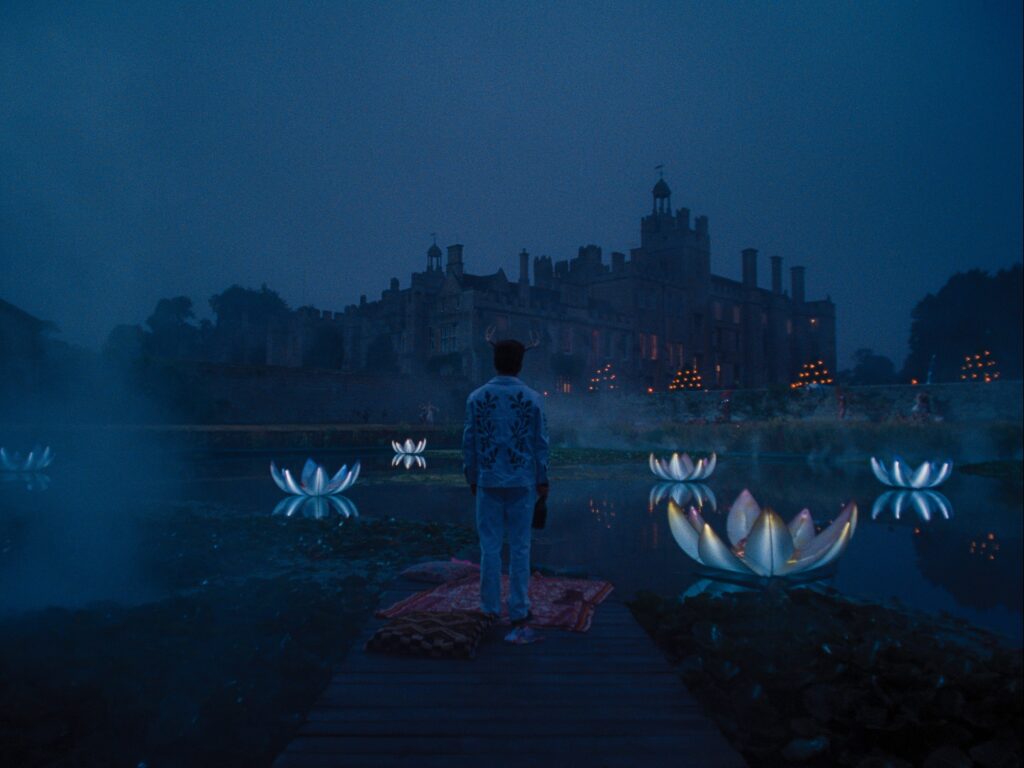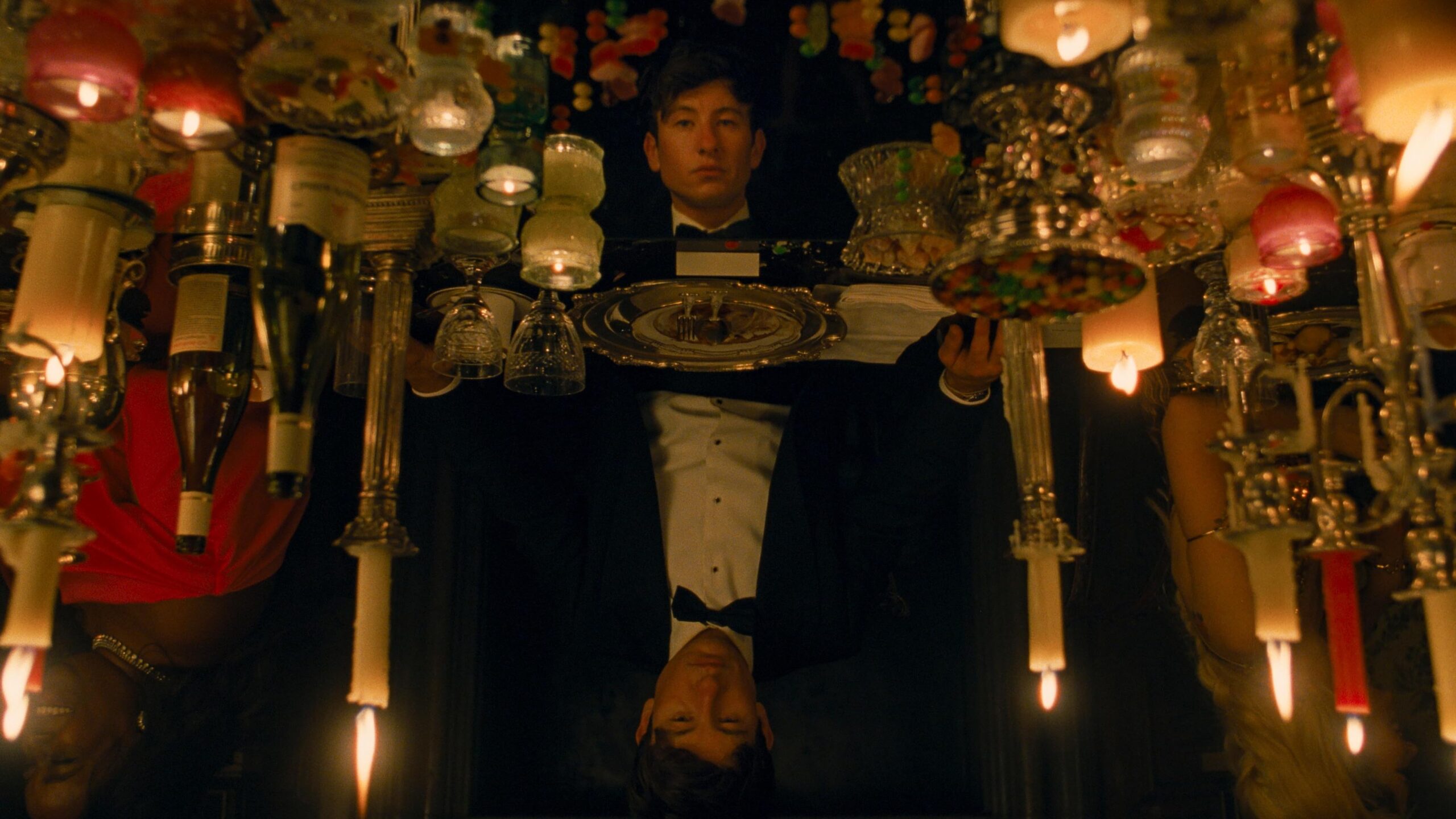The year is 2007, MGMT’s generation-defining hit “Time to Pretend” is blasting, and the Catton family is lounging by the lake in the yard of their sprawling, palatial estate of Saltburn. Its mammoth construction of beige stone and perfectly manicured acres of green are a deceptively dignified veneer for Saltburn’s ignoble residents: the eccentric patriarch James (Richard E. Grant) and his appearance-obsessed wife Elspeth (Rosamund Pike); their troubled, wily daughter, Venetia (Alison Oliver); their money-leeching nephew Farleigh (Archie Madekwe); and their son Felix (Jacob Elordi), whose Adonic stature and boyish charm make him golden boy of Oxford’s student body. In Saltburn (2023), written and directed by Emerald Fennell, our narrator Oliver Quick (Barry Keoghan) is one of many classmates who become entangled in Felix’s web; when he gets an invite to spend the summer holiday with the Cattons, his initial magnetism toward Felix festers into a much darker form of obsession.
The follow-up to Promising Young Woman (2020), Fennell’s feature-length debut as writer and director that won her the Oscar for best original screenplay, Saltburn similarly traffics in the twisted and perverse. A stirring investigation of external beauty and the insidiousness that foments beneath it, the film masterfully deploys imaginative visual elements and a razor-sharp script of wit and provocation; the meticulously curated mise-en-scène, stunning cinematography and score, and stellar cast bewitch viewers into a stupor of desire and temptation. Unfortunately, after inviting us to interrogate their own limits, Fennell leaves us hanging when her show-stopping twist unravels much of the film’s complexity.
By packaging vices in glitter and eye candy, Fennell tests her viewers’ ability to resist their own urges. “The film is about what we as an audience are willing to forgive for beauty and charm,” Fennell told the Voice over Zoom. Embodying this challenge is Felix, whose affection Oliver covets throughout the film. “Oliver’s fantasy of Felix makes him much more interesting than he actually is,” Fennell said. “He looks like a god, but he’s a mortal. He’s just some guy. And in fact, he’s a guy that’s not even very nice.”
From the very beginning, Fennell and cinematographer Linus Sandgren use visual elements to captivate the audience with the illusion of Felix. Although Oliver says he was never in love with Felix—which Fennell says “we know [is] a lie”—after watching a montage of the effortlessly sexy Elordi set to swelling strings with hazy, haloed lighting, we’re left asking: who wouldn’t be in love with him? The more we get to know him, though, the more we see how he weaponizes his charm to further his selfish ends.
Explaining why she chose college-aged students for her protagonists, Fennell said that it’s the newfound ability to construct one’s own facade that intrigued her. “We all choose a university for a very specific reason, not just because it’s got the best course, but also because of the way that we think we will be if we go there,” she said. “I think everyone makes themselves up at this time.”
When we meet his family, we learn that Felix is only one contributor to what Fennell dubbed “the human detritus left behind by the Catton family.” Despite their attempts to seem tight-knit, the Cattons’ obsession with appearances supersedes any meaningful relationships; Elspeth even divulges to Oliver upon meeting him that she has “a complete and utter horror of ugliness,” epitomizing her preoccupation with external beauty. They take pains to eschew discussing wealth explicitly—Felix nonchalantly tells Oliver that one of the beds “still has Henry VIII’s spunk on it”—yet they insist on black tie attire for dinner; they have an extensive, penguin-suited house staff, yet they casually sit around watching Superbad (2007) under a crystal chandelier and centuries’-old artwork. Oliver quickly catches on to their ways, proving himself as a true Catton in his willingness to indulge their faux-humility.
Saltburn itself is also guilty of deception—its regal exterior and labyrinthine design conceal the decadent, downright hedonistic indulgences of its inhabitants. Fennell and cinematographer Linus Sandgren constructed every frame to entrap viewers in the fantasy, challenging them to not look away even in the most debauched moments (of which there are several). “Me and Linus [Sandgren], the amazing cinematographer, talked a lot about the film being able to work as a silent movie as much as anything else—us being able to understand what’s happening emotionally from the mise-en-scène, and the camera moves, and lighting choices, blocking choices,” Fennell said.

Courtesy of Amazon Studios/MGM Rosamund Pike as ElspethCourtesy of Amazon Studios/MGM
The staggeringly talented cast imbues the stunning sets with life. Keoghan’s Oliver instills dread and sympathy in the audience with a single glance; no stare is empty, each communicating its own strain of despair, frustration, or intrigue. Keoghan’s chemistry with the perfectly cast Elordi buttresses his performance. Elordi’s deft maneuvering between lovable schoolboy, woefully neglected son, and irresistible flirt gives the mythic Felix unexpected depth. Unfortunately, the main obstacle between the two men is the unconvincingly formidable Farleigh, whose distrust of Oliver threatens to alienate the newcomer from the Cattons—but his attempts at intimidation come across as apathetic and childish, as though Madekwe learned his lines minutes before. The unexpected gem, though, is Pike’s Elspeth: cold, elegant, and hilariously dry, she brings Fennell’s quippy one-liners to life, eliciting out-loud laughter from the audience at one moment and cruelly cutting down her family members the next.
But once we’ve come to know and love (or hate) our characters, a twist with the potential to undermine all of the film’s emotional labor reveals itself in the final act. We learned earlier that Oliver had lied about having absentee parents to secure an invite to Saltburn for the summer; but after Felix’s unexpected death and funeral, we’re taken back to Oxford to see how every moment Oliver grew closer to Felix—starting with their coincidental meet-cute on campus—was contrived. We’re brought to the night of Felix’s murder, when Oliver poisoned his drink and left him to be found by the Cattons the next morning. What was initially portrayed as a crush turned obsessive reveals itself as a convoluted plot of deception; we come to question whether Oliver’s sole motive was wealth the whole time, threatening to water down the complex feelings of emotional and physical yearning we believed that Oliver had.
“We all lie all the time. And so the thing about Oliver is, like all of us, he’s just using the things at his disposal to get the things he wants.” Fennell said. “Whether we feel like Oliver is our hero or our villain, that’s kind of up to the person who watches it to decide. We’re all villains and heroes in our own life; there’ll be a person in all of your lives who thinks of you as a villain.”
With the revelation of Oliver’s machinations, it’s difficult to imagine how he could be seen as a hero, unless we’re expected to pity him for his perverted sense of love. In that case, Oliver could be seen as a tragic hero of sorts, forced to kill the thing he loved in order to preserve his idea of it.
Despite his scheming and murders, Fennell herself insists that Oliver was motivated by more than greed: “He just wanted what we all wanted, which was to be loved back in the same way.” She added, “[Saltburn] is intimate, it is maybe transgressive for some people, but I’m trying to always get to something honest and complicated.”
One of Saltburn’s most disturbing scenes arrives after Felix’s funeral when Oliver violently sobs at his grave while having sex with the fresh soil. Keoghan’s performance makes this heinous act almost sympathetic, forcing viewers to contend with conflicting feelings of despair and disgust. Nevertheless, his final “goodbye” demonstrates that to him, sex was more about ownership and power than it was intimacy, making it nearly impossible to empathize with his aberrant sense of grief.
Interested in where to “apply pressure” to the audience, Fennell explained that Saltburn’s most controversial moments make it as much a social experience as a personal one. “Everyone feels differently about what they’re seeing,” she said. “Some people are laughing. Some people are laughing with embarrassment. Some people are squirming. Some people are turned on. And then at one point, the audience starts to turn on itself because everyone thinks that everyone else’s response is crazy and wrong.”
Although we’re originally asked to identify with Oliver, in retrospect, Fennell and Sandgren stealthily planted seeds of mistrust in him with visual elements like mirrors and ominous close-ups in profile. Statues placed methodically around Saltburn also hinted that a big reveal was in the works, as they bore witness to scandalous acts that the perpetrators thought went unnoticed. The colossal minotaur at the center of The Labyrinth, the backyard hedge maze, looms over Felix as Oliver watches him have sex with a woman perched on the base of the statue. Contrasting his angel costume complete with gilded wings, the monster exposes the fallacy of Felix’s supposed innocence and foreshadows his death. Indeed, the next morning, a bird’s-eye-view of The Labyrinth shows Felix lying dead at the center, his wings glinting in the sunlight as the minotaur casts its parallel to his lifeless body—an unforgettable shot epitomizing the methodical genius of Fennell and Sandgren’s collaboration.
Of her choice of statue, Fennell said that she expects the audience to bring their own knowledge of history and pop culture to the film. “You can look at references, like the minotaur, [and] you can talk about Midsummer Night’s Dream and how that kind of deals with identity and the kind of upending of social constructs. All of that stuff, it’s joyful because for me, I think it’s sort of mad and futile to sort of pretend that these other films, these other books, these other things don’t exist.”
 Courtesy of Amazon Studios/MGM
Courtesy of Amazon Studios/MGM
The constant struggle between beauty and depravity instills each shot with contradiction. Early scenes of Oliver gazing at Felix are simultaneously whimsical and uncomfortable, as he longingly—and voyeuristically—watches through windows, keeping a pane of distance between them. However, as Oliver closes in, so does the cinematography, zeroing in on the most attractive elements of Saltburn in tempting but uncomfortable ways. Fennell and Sandgren never let the visual appeal of the estate or its inhabitants go unnoticed, even as we see Oliver commit his most depraved acts, forcing us to interrogate our own limits when it comes to realizing our desires.
Whatever our takeaways, one thing is clear: Fennell won’t give us any answers. “I don’t think it’s a satisfying cinematic experience for me when I feel I’ve just been told entirely what it is I’ve just seen,” she said. “I suppose I’m not interested in making any moral judgment at all. I’m only interested in looking at how we relate to each other and how power works and how we behave.”







